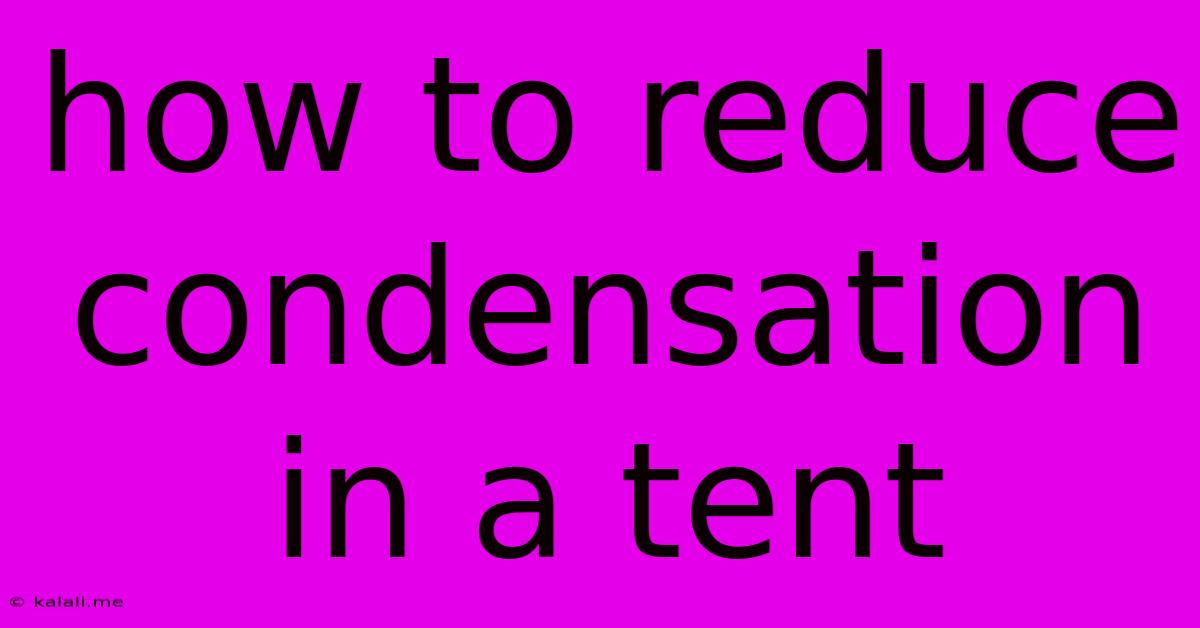How To Reduce Condensation In A Tent
Kalali
May 21, 2025 · 3 min read

Table of Contents
How to Reduce Condensation in Your Tent: A Comprehensive Guide
Condensation in a tent is a common camping frustration. That damp feeling on your sleeping bag, the water droplets clinging to your tent walls – it's not ideal for a comfortable night's sleep. But don't despair! This comprehensive guide will equip you with the knowledge and techniques to significantly reduce condensation in your tent, ensuring drier, more comfortable camping trips.
Why Does Condensation Occur in Tents?
Condensation happens when warm, moist air inside your tent comes into contact with the cooler surfaces of the tent's walls and flysheet. This warm air cools, causing the water vapor to condense into liquid water. Several factors contribute to this:
- High humidity: A humid environment outside your tent means there’s more moisture in the air to begin with.
- Body heat and breath: You and your camping companions exhale moisture, contributing significantly to the humidity inside.
- Cooking and other activities: Cooking, boiling water, and even simply breathing can increase moisture levels.
- Poor ventilation: Lack of proper airflow prevents moisture from escaping, leading to a build-up and condensation.
- Temperature differences: A significant difference between the inside and outside temperatures exacerbates condensation.
Effective Strategies to Minimize Tent Condensation
1. Improve Ventilation:
This is arguably the most effective method. Maximize airflow by:
- Opening vents: Always keep tent vents open, even slightly, to allow air circulation. Consider opening them at both ends for cross-ventilation.
- Using a tent with good ventilation: When buying a new tent, prioritize models with ample ventilation features, such as multiple vents, mesh panels, and a well-designed flysheet.
- Avoid sealing the tent completely: Resist the urge to completely seal your tent, especially during warmer weather.
2. Manage Moisture Sources:
Reducing the amount of moisture entering your tent is crucial:
- Dry your gear: Before entering your tent, ensure your clothing, sleeping bag, and other gear are as dry as possible.
- Use moisture-absorbing materials: Consider using moisture-wicking clothing and sleeping bags.
- Cook outside: Whenever feasible, cook outside your tent to avoid introducing moisture and smells.
- Limit water usage inside: Minimize activities inside the tent that generate moisture, such as boiling water or washing dishes.
3. Choose the Right Tent:
The type of tent plays a role in condensation:
- Double-walled tents: These tents offer better protection against condensation compared to single-walled tents due to the air gap between the inner and outer layers.
- Mesh panels: Tents with mesh panels improve ventilation and air circulation.
- Consider the tent's material: Some tent materials are more breathable than others. Look for materials specifically designed for breathability.
4. Use a Tent Footprint (Optional):
A tent footprint provides an extra layer of protection and can help with condensation management, but only in certain circumstances. This is more helpful for preventing moisture from seeping up from the ground. However, it doesn’t directly address condensation from humid air.
5. Camp in well-ventilated locations:
Selecting a well-ventilated campsite can significantly reduce condensation. Avoid pitching your tent in low-lying areas or areas with poor airflow.
Preventing Condensation: A Summary of Best Practices
- Maximize ventilation: Keep vents open!
- Minimize moisture sources: Dry gear before entering, cook outside, limit water usage.
- Choose a well-ventilated tent: Consider mesh panels, double-walled design, and breathable materials.
- Consider a tent footprint: To prevent ground moisture, not air moisture, from impacting your tent.
- Choose a well-ventilated campsite: Avoid low-lying, poorly ventilated areas.
By implementing these strategies, you can significantly reduce condensation in your tent and enjoy a much more comfortable and dry camping experience. Remember, a little proactive planning goes a long way in creating a more pleasant camping adventure.
Latest Posts
Latest Posts
-
Having A Good Opinion Of Ones Character
May 21, 2025
-
Toilet Not Flushing Properly Water Rises
May 21, 2025
-
Walk From Euston To St Pancras
May 21, 2025
-
How Many Planets Are In No Mans Sky
May 21, 2025
-
What Are You Up To Now
May 21, 2025
Related Post
Thank you for visiting our website which covers about How To Reduce Condensation In A Tent . We hope the information provided has been useful to you. Feel free to contact us if you have any questions or need further assistance. See you next time and don't miss to bookmark.